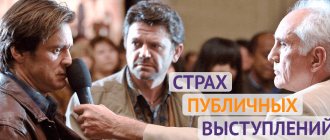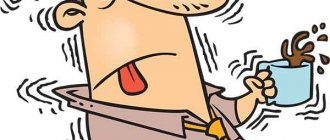Make your workplace comfortable and keep it in order
When it is comfortable to work at a desk, your productivity increases. Concentrating on tasks is much more difficult if the table is cluttered, the chair is uncomfortable, the light from the lamp is annoying, and the room is stuffy or cold. Therefore, you need to fix the things in your room that make you uncomfortable studying, and learn to maintain constant order. If on your desk there are only those textbooks, notebooks and printouts that are needed at the moment, you will not have to waste extra energy looking for the right thing.
Concentration: what it is and how it works
Let's start with the most basic: what is concentration? According to psychologists, it is the act of directing interest or action towards one goal. Yes, it sounds boring, but there is a very important idea hidden here.
What is concentration
To concentrate on one thing, you have to ignore everything else.
Concentration appears only when we say “yes” to one option and “no” to all the others. In other words, exclusion is a necessary condition for concentration.
What you don't do determines what you can do.
Tim Ferriss
writer, speaker
Of course, staying focused doesn't require saying no all the time; it's about saying no now, in the moment. Later you can do something else, but for now you should focus your attention on only one thing.
Focus is the key to productivity. By saying no to any other options, you open up your ability to complete the one remaining task.
Now the important question: what can you do to focus on the things that matter and ignore the unhelpful ones?
Why can't I concentrate?
Most people don't have problems concentrating. They have difficulty making decisions.
We can convince ourselves to focus on the task at hand by removing all distractions from the path. Have you ever had a task that you had to finish no matter what? You did it because the deadline made the decision for you. You may procrastinate, but as soon as the matter forces you to make a decision, you act.
Often, instead of making the difficult decision to choose one thing to do, we convince ourselves that it is better to multitask. But this is an ineffective approach, and here's why.
Why multitasking doesn't work
Technically, we can do two things at the same time. For example, watch TV and cook dinner or answer incoming calls during a phone call.
But it is impossible to concentrate on two things at the same time. You're either watching TV while stirring pasta in the pan in the background, or you're cooking pasta and the TV becomes background noise. At any given moment you are concentrating on either one or the other.
Multitasking forces your brain to quickly switch attention from one thing to another. And if the human brain could move from one job to another without additional effort, there would be no problem. But our heads don't work that way.
Remember a time when someone interrupted you while you were writing a letter. When the conversation ends, it usually takes you a few minutes to get your bearings, remember what you wrote about, and continue. Something similar happens when you do several things at once.
Every time you switch from one task to another and back again, you have to exert mental effort.
In psychology, this is called the switching cost effect.
Switching costs are the interruptions in productivity we experience when we shift our attention from one task to another. Research Reducing the effect of email interference on employees. A 2003 study published in the International Journal of Information Management found that when distracted by routinely checking email every five minutes, a person spends an average of 64 seconds resuming the task at hand.
In other words, we waste one minute out of every six on email alone.
The myth about multitasking is that it makes you more efficient. What really matters is concentration.
What foods will help improve your attention level?
If you're reading this article, wondering how to improve your focus, and your stomach is screaming for a snack, I have good news for you. I will tell you about products that increase attention.
- Coffee + cinnamon
Just 2-3 cups of coffee a day improves both long-term and short-term memory. A pinch of cinnamon helps enhance the effect.
- Green tea
This ancient drink contains L-theanine, an amino acid that improves brain function, activating areas associated with relaxation and memory.
- Proper breakfast
This meal is the most important. Choose natural foods that give you energy throughout the day instead of processed foods. Don't even think about a donut for breakfast! You will fall asleep at your desk by 10 am.
- Berries
Not only are fruits and berries very good for overall health, reducing the risk of Alzheimer's disease, studies show that they improve concentration for 5 hours. It's all about the antioxidants that are included in their composition. They increase the concentration of oxygen in the blood. This helps the brain solve problems faster and easier.
- Dark chocolate or cocoa
Dark chocolate increases blood flow to the brain and protects against age-related memory loss. Chocolate also stimulates the production of substances that improve mood and well-being. This way you will get the job done quickly and efficiently, while also flashing a smile.
- Water+lemon
Dehydration is strongly linked to the ability to concentrate. And the aroma of lemon increases productivity in tasks that require great concentration.
- Buryak
Yes, yes, Buryak. This vegetable also falls into the category of “attention enhancers.” It increases the amount of oxygen in the blood and helps you concentrate.
- Mint tea
It has no caffeine. But the aroma of mint helps increase concentration, reduces anxiety and fatigue, and increases motivation and productivity.
So if you still can't concentrate, take a short break and have a cup of tea with a piece of chocolate.
Life hacks to improve concentration
Even when you are truly passionate about the process and know how to stay focused on your goals, daily practice can create chaos and harm your mindfulness. Here are some additional ways to improve your concentration.
Select an anchor task
Choose one (and only one) priority for each workday. Although I plan to complete other tasks throughout the day, my priority is one non-negotiable task that I must finish. I call it the "anchor task."
With a single priority, we don't hesitate to start building our lives around that commitment.
Manage your energy, not your time
If a task requires your full attention, schedule it for a specific time of day when you have the energy for it. For example, I noticed that my creative energy is highest in the morning. I feel more alert in the morning, write better, and make better strategic decisions for my business. That's why I plan all my creative tasks for the morning. And I push all other work matters to the second half of the day: meetings, answering incoming messages, phone calls and Skype chats, analysis and processing of numerical information.
Almost every productivity strategy includes advice to better manage your time. But time itself is useless if you don't have the energy to complete the task.
Never check email in the morning
Concentration is the elimination of all distractions. And email can be your biggest distraction.
If I don't check email at the beginning of the day, I can create my own routine rather than having to adapt to someone else's routine.
I understand that for many people there is no point in waiting until the afternoon, but I want to challenge you. Can you wait until 10 am? Or until 9? Until 8:30? The exact time of the restriction is not that important. The point is that you can carve out time in the morning where you can focus on what matters most to you.
Leave your phone in another room
I usually put my phone away in the morning. It is much easier to get into the mood for work if SMS, phone calls or notifications do not distract your attention.
Work in full screen mode
Every time I run a program on my computer, I use it in full screen mode. If I read an article on the Internet, the browser takes up the entire screen. If I'm writing notes in Evernote, I use full screen mode. If I'm editing images in Photoshop, the program window is the only thing I can see. I configured the desktop so that the menu bar would automatically disappear. When I'm working, I can't see the time, application icons, or all the other distracting things.
It seems like a small thing, but in terms of concentration, this is a very important action. If you see an app icon, you'll be tempted to click it from time to time. However, if you remove the visual signal from your field of vision, then the desire to be distracted disappears after a few minutes.
How to Focus and Increase Your Attention Span
Let's talk about how to overcome our tendency to multitask and focus on one thing at a time. How do you know which of the many possible options you should pay attention to?
Warren Buffett's Two List Strategy
One of my favorite techniques for focusing on what's important and eliminating everything else comes from famous investor Warren Buffett.
Buffett used a three-step strategy for improving personal productivity to help his employees set priorities and plan actions.
Buffett once asked his personal pilot to perform a simple three-step exercise.
- Step 1: To get started, Buffett asked pilot Mike Flint to write down his top 25 career goals. It took Flint some time to sort it out and write it. Tip: You can do this exercise with short-term goals. For example, make a list of 25 things you want to complete this week.
- Step 2: Buffett then asked Flint to review his list and select the 5 most important goals. This again took Flint some time, but in the end he chose the 5 highest priority targets.
- Step 3. At this point, Flint has two lists. The five most important items were combined into List A, and the remaining twenty into List B. Flint decided that he would immediately begin working on the five most important goals.
And at that moment Buffett asked what he was going to do with the second list.
Flint replied: “The five most important goals are my main focus, but twenty others are important too, so I will work on them from time to time when the opportunity arises. They are certainly not that urgent, but I still plan to pay attention to them.”
To which Buffett said: “No, Mike, you got it all wrong. Anything other than your top five goals is a list of things to avoid at all costs. No matter what happens, you should not pay attention to the B list until you achieve five important goals."
I love Buffett's method because it forces you to make tough decisions and eliminate things that might be a good use of your time, but not a good use of it. Thus, from the tasks that distract attention, you choose those that are really worth spending time on.
This is just one way to direct your attention and abstract from all distractions. There are others, such as the Eisenhower matrix or the Ivy Lee method.
But no matter what method you use and no matter how serious you are, at some point the concentration disappears. How to stay focused longer? To do this you need to follow two simple steps.
Measure your results
Attention often disappears due to lack of feedback. Naturally, your brain wants to know if you are achieving your goals.
We all have areas of our lives that we claim are very important to us, but that we don't keep track of. This is a fundamentally wrong approach. Only with the help of numbers and full tracking can we take action when we get better or worse.
- When I started counting how many push-ups I did, I became stronger.
- When I started following the 20-page-a-day reading habit, I read more books.
- When I wrote down my values, I became more principled.
The tasks I was tracking remained my focus.
Unfortunately, we often avoid measuring results because we are afraid the numbers will be unimpressive. Understand that measurement is not needed to judge yourself. This is simply the feedback you need to understand where you are now.
Measure to discover, to know, to understand. Measure to know yourself better. Measure because it will help you focus on the things that matter to you.
Value progress, not outcome measures
The second thing you can do to stay focused longer is to focus on the process rather than the events. Too often we think of success as something that can be achieved and completed.
Here are some examples.
- Many people think of health as an event (“If I can lose 10 kilograms, I’ll be in great shape”).
- Many people think of entrepreneurship as an event (“If our business was written about in the New York Times, we'd be successful”).
- Many people think of art as an event (“If my paintings were exhibited in a big gallery, I would become famous”).
These are just a few examples of many where we define success as a single event. But if you look at people who are focused on their goals, you will understand that it is not the events or results that matter, but the focus on the process itself. These people love what they do.
And the funny thing is, focusing on the process will allow you to enjoy the results anyway.
- If you want to be a good writer and publish a bestseller, that's great. But the only way to achieve this result is to love writing.
- If you want the whole world to know about your business, it would be a good idea to be featured in Forbes magazine. But the only way to achieve this is to love the process of promotion.
- If you want to get fit, you may really need to lose 10 extra pounds. But the only way to achieve this result is to love healthy eating and exercise.
- If you want to become much better at anything, you have to love the process. You have to fall in love with building an image of a person who does business, and not just dream about the desired results.
Focusing on goals and results is our natural tendency, but focusing on progress leads to greater results in the long run.
Medications
You can increase concentration and improve the general condition of the body with the help of a number of medications:
- Glycine. Relieves stress, calms, increases brain performance and attention.
- Vitrum memory. Medicine based on herbal ingredients. Enhances alertness, normalizes blood circulation and, as a result, brain nutrition.
- Undevit. Vitamins A, B, C, E, P. Has a general strengthening effect.
- Aminalon. Helps remove toxins accumulated in the body and restore the functioning of the nervous system, thereby improving performance and concentration.
- Bilobil. Improves sleep and mental activity, eliminates anxiety.
- Intellan. Helps cope with depression and eliminates forgetfulness.
- Ginkgo biloba. Improves memory and the ability to maintain attention, eliminates insomnia and dizziness.
The listed drugs have virtually no contraindications or side effects. However, it is recommended to consult a doctor before using them.
Mini tips for every day
What else can help develop attention besides special exercises and techniques? Useful habits. They are so simple and easy that you can easily fit them into your life.
- Develop your powers of observation. Walking down the street, try to notice as many details as possible. Remember what trees grow in your yard, what hairstyle your neighbor Masha has, what color the cars passing by are.
- Do the same when going to the store. Try to remember how the display cases are located and what products are displayed on them. When you get home, recreate the picture in your mind in all details.
- When communicating with people, note how they look: what they are wearing, what color their eyes are, what shape their eyebrows are, etc.
- Stop doing everything “automatically”! Practice mindfulness. Learn to live here and now and enjoy every moment.
Useful literature
I really like exercises to develop attention - they are simple and unobtrusive, but at the same time exciting. And most importantly, the effect comes quite quickly. If you, like me, want to study seriously, I advise you to purchase special books. They describe various methods for developing attention and present a wide selection of exercises.
For adults:
- “Theories of attention” Alexander Shevtsov
- “#The power of focus. Metaphysical law of success” Niko Bauman
- “The brain is in good shape. Workbook for training memory and attention” Tetsuya Miyamoto
- “How to quickly concentrate attention” Ilya Melnikov
- “How to improve memory and develop attention in 4 weeks” Tatyana Lagutina
For children:
- “School of Attention” Natalia Pylaeva, Tatyana Akhutina
- “350 exercises for developing logic and attention” Olga Uzorova, Elena Nefedova
- “Development of attention and memory with a neuropsychologist” Alexander Sobolev
- The Big Book of Attention Training
- “We train attention. Simple exercises and games” by A. M. Kruglova
For a detailed review of the literature, see the article “Books on developing attention.”










